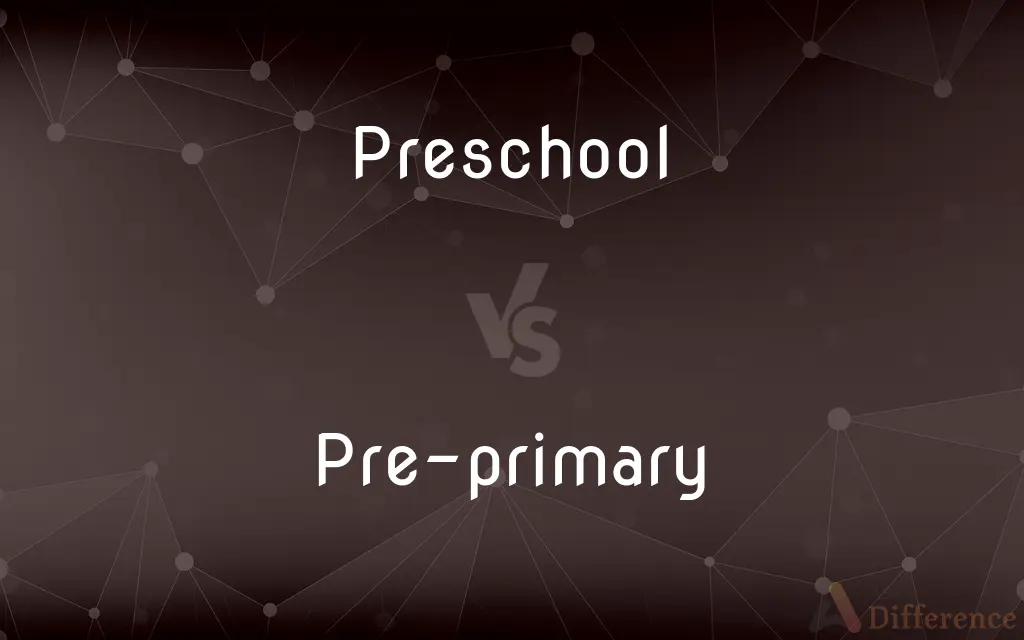Preschool vs. Pre-primary — What's the Difference?
Edited by Tayyaba Rehman — By Fiza Rafique — Published on November 6, 2023
Preschool focuses on early childhood education for ages 2-4, while Pre-primary is a broader term that includes preschool and kindergarten, typically for ages 2-6.

Difference Between Preschool and Pre-primary
Table of Contents
ADVERTISEMENT
Key Differences
Preschool and Pre-primary are both essential phases in early childhood education. Preschool caters to young children, generally between the ages of 2 and 4, focusing on play-based learning. Pre-primary, on the other hand, covers a broader age range, including children up to 6 years old, and often encompasses both preschool and kindergarten.
Preschool is primarily centered around introducing children to a structured environment for the first time. It emphasizes socialization, basic motor skills, and foundational concepts through play and exploration. Pre-primary, meanwhile, starts to introduce more formal education components, laying the groundwork for elementary school.
In many educational systems, Preschool is optional, serving as an introduction to the educational journey. It's a place where kids learn by playing, exploring, and interacting with their peers. Pre-primary includes these foundational experiences but begins to integrate more structured learning, especially in its latter stages like kindergarten.
The curriculum in Preschool is usually less rigid than in Pre-primary. Preschool teachers create an environment where kids can learn organically, developing cognitive and motor skills. In Pre-primary settings, while play remains integral, there's a stronger emphasis on preparing children for the next phases of their academic journey.
While both Preschool and Pre-primary are crucial for a child's early development, the former is more about adapting to an educational setting, and the latter starts to set the tone for a child's formal education.
ADVERTISEMENT
Comparison Chart
Age Range
Typically for ages 2-4.
Typically for ages 2-6, including preschool and kindergarten.
Focus
Play-based learning, socialization.
Broader curriculum including structured learning for kindergarten.
Duration
Often shorter, half-day sessions.
Can vary, often includes full-day sessions especially in kindergarten.
Optional/Mandatory
Generally optional.
Might be mandatory in some educational systems, especially kindergarten.
Preparation For
Adapting to a structured environment.
Preparing children for more formal education in elementary school.
Compare with Definitions
Preschool
A place focused on play-based learning.
In Preschool, children learn primarily through play and interaction.
Pre-primary
An educational phase that includes preschool and kindergarten.
Sam is in the Pre-primary section, soon heading to first grade.
Preschool
Often optional in many educational systems.
Parents may choose to enroll their children in Preschool for early exposure.
Pre-primary
Serves children typically between the ages of 2 and 6.
Pre-primary education lays the foundation for further academic success.
Preschool
Introduces children to a structured educational environment.
Preschool is a child's first step into the world of education.
Pre-primary
Combines play-based learning with structured education.
In Pre-primary, kids enjoy playtime but also start formal learning.
Preschool
An early childhood educational setting for ages 2-4.
Lucy started attending Preschool last month and she loves it.
Pre-primary
Prepares children for formal elementary education.
After completing Pre-primary, kids are ready for the challenges of grade school.
Preschool
Emphasizes socialization and basic motor skills.
At Preschool, Jake learned how to share toys and play with others.
Pre-primary
Often a blend of optional and mandatory stages.
While preschool might be optional, kindergarten in the Pre-primary is often mandatory.
Preschool
Of, relating to, intended for, or being the early years of childhood that precede the beginning of elementary school.
Pre-primary
Taking place before primary school.
Pre-primary education
Preschool
A school for children who are not old enough to attend kindergarten; a nursery school.
Preschool
Of or relating to the years of early childhood before attendance at primary school.
Preschool
A nursery school.
Preschool
(transitive) To provide nursery school education for.
Preschool
(intransitive) To undergo nursery school education.
Preschool
An educational institution for children too young for elementary school
Common Curiosities
Which phase comes after Pre-primary?
After Pre-primary, children typically move on to elementary or primary school.
Is play important in both Preschool and Pre-primary?
Yes, play is crucial in both stages, though Pre-primary starts to include more formal learning components.
Is kindergarten part of Pre-primary?
Yes, kindergarten is typically considered a part of the Pre-primary phase.
Are there standardized tests in Preschool?
Preschool generally focuses on play and exploration without standardized tests.
What skills do children acquire in Pre-primary?
In Pre-primary, children acquire social, cognitive, and basic academic skills, preparing them for elementary school.
Is Preschool mandatory?
No, Preschool is generally optional in most educational systems.
How long is a typical Preschool day?
Preschool often has shorter, half-day sessions, though it can vary.
Are teachers in Preschool and Pre-primary specially trained?
Yes, both Preschool and Pre-primary teachers usually undergo specialized training in early childhood education.
Are there set subjects in Preschool?
Preschool doesn't usually have set subjects; instead, it emphasizes holistic learning through play.
What age group does Preschool cater to?
Preschool typically caters to children aged 2-4.
How does Pre-primary differ from Preschool?
Pre-primary encompasses a broader age range, including both preschool and kindergarten, and integrates more structured learning.
What's the main goal of Preschool?
Preschool aims to introduce children to a structured educational setting, emphasizing play and socialization.
Which is more academically rigorous: Preschool or Pre-primary?
Pre-primary tends to be more academically rigorous, especially as it includes kindergarten, preparing children for elementary school.
How are parents involved in Pre-primary education?
In Pre-primary, parents often engage in parent-teacher meetings, school events, and supporting learning at home.
Do Pre-primary schools have a more defined curriculum than Preschools?
Yes, while play remains central, Pre-primary, especially in kindergarten, starts to follow a more defined curriculum.
Share Your Discovery

Previous Comparison
Web Hosting vs. Web Publishing
Next Comparison
Humoral Immunity vs. Cell-Mediated ImmunityAuthor Spotlight
Written by
Fiza RafiqueFiza Rafique is a skilled content writer at AskDifference.com, where she meticulously refines and enhances written pieces. Drawing from her vast editorial expertise, Fiza ensures clarity, accuracy, and precision in every article. Passionate about language, she continually seeks to elevate the quality of content for readers worldwide.
Edited by
Tayyaba RehmanTayyaba Rehman is a distinguished writer, currently serving as a primary contributor to askdifference.com. As a researcher in semantics and etymology, Tayyaba's passion for the complexity of languages and their distinctions has found a perfect home on the platform. Tayyaba delves into the intricacies of language, distinguishing between commonly confused words and phrases, thereby providing clarity for readers worldwide.













































